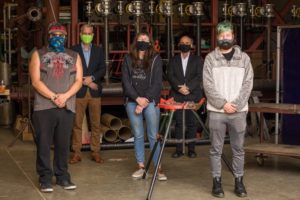Camosun College is receiving a $444,000 donation from the Dennis & Phyllis Washington Foundation in partnership with Seaspan Shipyards. Each year for the next three years, $100,000 of the donation will go toward new and already established scholarships and bursaries for women and Indigenous trades students at Camosun. The remaining $144,000 will go toward marine equipment such as welding booths and virtual training consoles. The money will also go toward creating a micro-credential in marine welding at the college.
Camosun vice president of partnerships Geoff Wilmshurst says the micro-credential course, which is still being finalized, will provide training that is marine specific, and students will learn to work at the Camosun Coastal Centre or in the tight quarters of a ship as opposed to the parameters of a trades shop on campus.
“We haven’t actually got into the nitty gritty of developing a course yet, but we will do that soon, and now that we’ve been gifted this equipment, that will allow us to be able to start working towards the development of a particular course,” says Wilmshurst.

Wilmshurst says that the Dennis & Phyllis Washington Foundation has been a “huge supporter of Camosun over many years” and that the college is really excited to receive the donation, which is part of the foundation’s larger Diversifying the Tools for Success initiative.
“This just adds to what has been an incredible legacy of gift giving from both organizations,” he says.
Wilmshurst says that having virtual training consoles means students will have opportunities to learn welding without having to use traditional welding-booth arrangements: they could take a couple hours off work, go up to the Camosun Coastal Centre and study for the micro-credential, then go back to work afterwards.
“There’ll be an opportunity, for example, for workers who are in the marine industry, especially down [at the shipyards], to be able to book off the job for a couple of hours, get some specific field training, and then go back to the job after,” he says.
Wilmshurst calls funding for student essentials—food, work clothes, and textbooks—critically important, especially for those who need extra supports.
“We have marginalized groups in our society that really need those extra supports in order to be able to take the time to get the training that they need in order to, kind of, move up,” he says.
Wilmshurst uses access to adequate childcare for women in trades as an example of the type of essential support offered to students through the donation.
“Without the ability to have access to childcare and have the money to access childcare, they simply can’t step away from their household duties in order to be able to get the training and then move on into a career,” says Wilmshurst. “Food security is another one—clothing and equipment is hugely expensive and there’s lots of folks in our community who don’t have the money to access that without some help. This is really important stuff. It’s something that Camosun has been doing for a while. I’m really, really happy that the Washington Foundation and Seaspan understood the need for that kind of support.”
Wilmshurst says the college hasn’t crunched the numbers to know exactly how many students the donation will help, but it “will certainly be in the hundreds.”
“I would expect that if it’s successful, we’ll have opportunities to do more fundraising towards this,” he says, “whether it be from the Washington Foundation or other organizations.”
